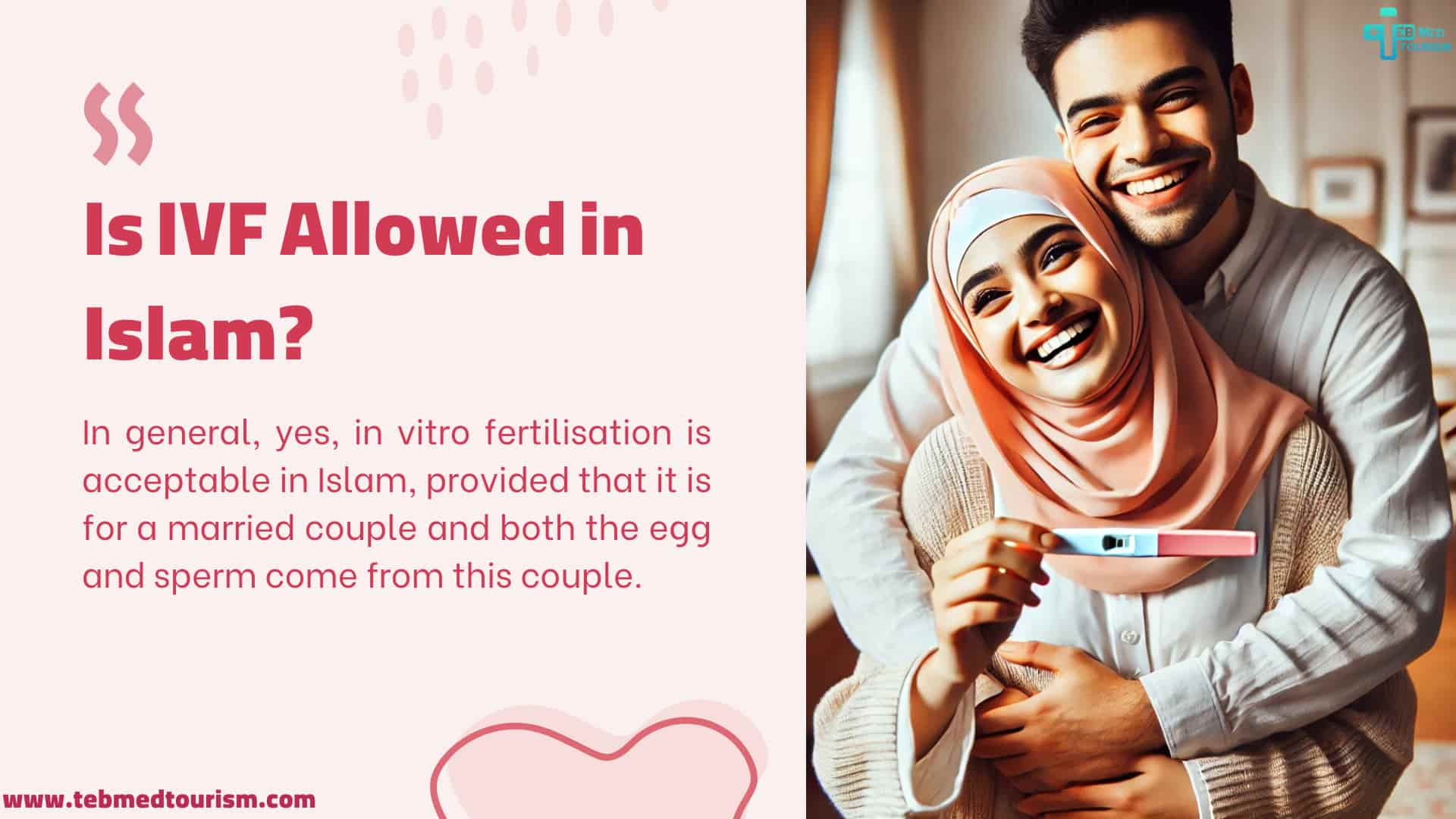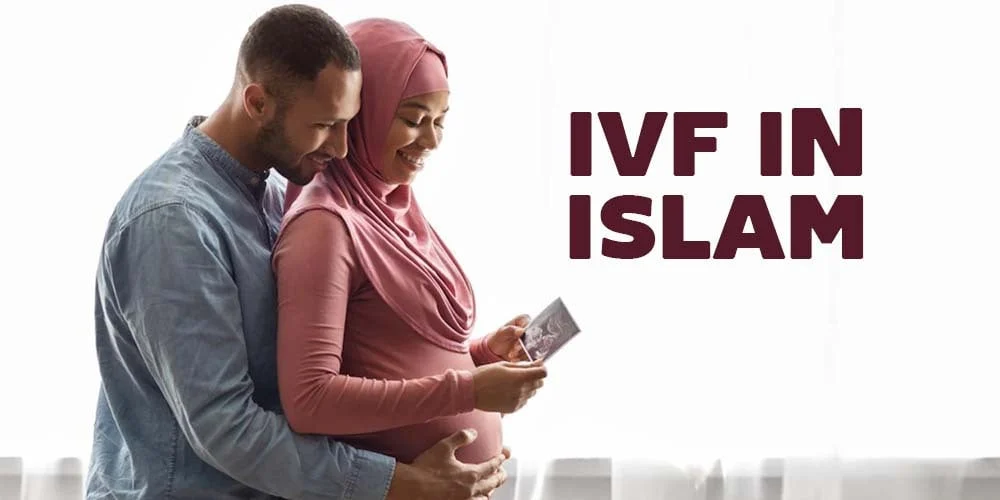In vitro fertilization (IVF) is a medical procedure that helps infertile couples achieve parenthood by fertilizing an egg with sperm in a lab and transferring the embryo to the uterus. In Islam, IVF in Islam raises ethical and religious considerations due to the importance of family and lineage. Muslim couples must ensure IVF aligns with Islamic principles while navigating its medical benefits.
IVF in Islam is generally accepted under specific conditions, but opinions among scholars may vary. IVF is permitted within a marriage; however, the involvement of third parties, such as egg or sperm donors, raises ethical and religious concerns for some. This article explores the views of different Islamic scholars and provides guidance for Muslim couples seeking fertility solutions.
Is IVF Allowed in Islam?
In Islam, family is very important. It is seen as the foundation of society, providing love, guidance, and support. The Quran and Hadith teach that marriage and having children are great blessings and encourage Muslims to create families and raise children with good values. Becoming a parent is a special gift, and the wish to have children is deeply connected to Islamic beliefs.
In vitro fertilization (IVF) is a modern medical method that has helped many couples who have difficulty having children. However, whether is IVF halal or not a topic of discussion among scholars. Islam places great importance on protecting family lineage, following marriage rules, and staying within ethical limits, which makes this topic sensitive and complex.

Not all Islamic scholars agree on IVF, and opinions can differ between Sunni and Shia interpretations. While both agree on the importance of preserving lineage and following Islamic rules, how these principles are applied may not be the same. In the next discussion, we will explain more about IVF in Islam Sunni or Shia, focusing on the main ideas and what Muslim couples need to know if they are considering this treatment.
Shia’s Views on IVF in Islam
Shia scholars generally agree that IVF is permissible in Islam, provided it follows certain guidelines to ensure that the process aligns with Islamic ethics. One notable aspect of Shia jurisprudence is its acceptance of third-party involvement, such as egg donation, under specific conditions.
This perspective is rooted in the understanding that assisted reproductive technologies can be a means of helping couples fulfill their desire for parenthood while preserving the sanctity of marriage and family values.
A key fatwa by Ayatollah Ali Khamenei allows the use of third-party donations in IVF, as long as the process respects Islamic laws and responsibilities. For example, the legal and social implications of using a donor must be addressed, and clear arrangements should be made for the child’s upbringing and lineage.
This ruling has made it
possible for many infertile couples in Shia communities to access advanced fertility treatments without feeling that they are compromising their religious beliefs.
While the involvement of a third party is more flexible in Shia views, scholars still emphasize the importance of maintaining transparency and following ethical practices. This approach highlights the dynamic nature of Shia jurisprudence in adapting to modern medical advancements while staying true to core Islamic principles.
Sunni Views on IVF in Islam
Sunni scholars generally agree that IVF is permissible under certain conditions, provided it adheres to the ethical and religious guidelines outlined in Islamic teachings.
The most widely accepted opinion is that IVF is allowed as long as it involves the sperm and egg of the married couple and the fertilized embryo is implanted into the wife. This ensures the process respects the sanctity of marriage and preserves the lineage, which are key principles in Islam.
When it comes to the involvement of a third party, such as egg donation, opinions among Sunni scholars vary. Many, like Sheikh Yusuf al-Qaradawi, strictly oppose third-party involvement, arguing that it disrupts the purity of lineage, which Islam places great importance on. This perspective considers such practices to violate the ethical boundaries of marriage and family.
However, some Sunni scholars allow third-party involvement in exceptional cases, provided all necessary steps are taken to maintain the ethical and legal framework of Islamic law. These scholars emphasize that helping a couple overcome infertility can be an act of compassion, aligning with the broader Islamic goal of supporting family creation. The variation in these opinions reflects the diverse interpretations within Sunni jurisprudence and the effort to address modern medical challenges while upholding core Islamic values.
All the Possibilities of IVF in Islam
Islamic teachings provide space for medical advancements, including IVF, as long as they align with ethical and religious principles. Over the years, Islamic scholars and medical experts have worked together to define the boundaries and possibilities of IVF within Islamic law. This collaboration has made it possible for Muslim couples to benefit from a wide range of fertility treatments while ensuring compliance with their faith.
One notable example is Iran, where a progressive approach to assisted reproductive technologies has been established. IVF in Iran is widely recognized because, guided by Shia jurisprudence, the country allows various forms of IVF treatments, including egg donation. This makes the country a unique destination for individuals or couples seeking advanced fertility solutions. With clear legal frameworks and ethical guidelines in place, Iran provides a supportive environment for families to grow, offering hope to those struggling with infertility.
TebMedTourism, a leading medical tourism company, plays a significant role in facilitating access to these services for international patients. With its team of experts and partnerships with top fertility clinics in Iran, TebMedTourism ensures that patients receive world-class care while navigating the complexities of treatment abroad. From their IVF consultation to treatment, the company supports couples through every step of their journey, offering a comprehensive range of IVF options that are both medically advanced and religiously compliant.
By embracing all permissible possibilities under Islamic law, IVF in Iran serves as a beacon of hope for Muslim couples worldwide, providing tailored solutions that respect both their personal needs and religious beliefs.
IVF Between Couples
IVF is generally permitted in Islam as long as it is carried out between a husband and wife in a valid marriage and complies with regulations that uphold the sanctity of marriage and safeguard family heritage. However, because it is thought to jeopardize ancestry and resemble the illegal act of adultery, IVF is not allowed for unmarried couples. In a similar vein, Islamic beliefs forbid IVF for same-sex couples because they believe that reproduction is only acceptable when a man and a woman are legally married, protecting family structure and ancestry.
Religious-Moral Standing of the Child
A child born through any of the prohibited procedures is considered a foundling due to the intended couple’s religious branch and the scholar’s opinion. It’s not attributed to a father but remains attached to his mother, as is the case with the child born outside marriage due to an adulterous relationship.
Physician Religious-moral Standing
In the context of IVF in Islam, the role of the physician extends beyond medical expertise. The religious and moral standing of fertility specialists is a crucial element in ensuring the treatment aligns with Islamic principles. Islamic teachings emphasize that medical interventions, particularly in matters of reproduction, must respect the sanctity of life, the family structure, and the ethical guidelines prescribed in the Quran and Hadith.
Physicians in Muslim-majority countries often seek guidance from religious scholars to ensure that they are following the ethical framework that aligns with both the scientific and religious aspects of their work.
Additionally, a physician’s moral standing is reflected in their commitment to patient confidentiality, informed consent, and respect for religious beliefs. A doctor who practices IVF in Islamic countries should be mindful of the sensitive nature of reproductive health, offering treatments in a way that maintains dignity, respects the ethical boundaries of the faith, and upholds the trust of the patients they serve.
The Quran’s and Hadith’s views on IVF in Islam
In Islam, IVF is viewed through the lens of the Quran and Hadith, which emphasize the sanctity of life, marriage, and family. Although neither the Quran nor the Hadith directly addresses IVF, they stress that life is created by Allah, and human interventions should align with divine will. Verses like Surah Ash-Shura (49-50) remind us that Allah decides who have children, making IVF a permissible tool for couples seeking help with infertility, provided it adheres to Islamic ethics.
“لِلَّهِ مُلْكُ السَّمَاوَاتِ وَالْأَرْضِ ۚ يَخْلُقُ مَا يَشَاءُ ۚ يَهَبُ لِمَنْ يَشَاءُ إِنَاثًا وَيَهَبُ لِمَنْ يَشَاءُ الذُّكُورَ (٤٩) أَوْ يُزَوِّجُهُمْ ذُكْرَانًا وَإِنَاثًا ۖ وَيَجْعَلُ مَنْ يَشَاءُ عَقِيمًا ۚ إِنَّهُ عَلِيمٌ قَدِيرٌ (٥٠)”
Translation:
“To Allah belongs the dominion of the heavens and the earth; He creates what He wills. He gives to whom He wills female [children], and He gives to whom He wills males, or He makes them [both] males and females, and He renders whom He wills barren. Indeed, He is Knowing and Competent.”
The hadith reinforces the importance of maintaining family lineage within a lawful marriage.
For example, a Hadith from Sahih Muslim (no. 1454) highlights that the child belongs to the husband and wife, emphasizing that IVF must not involve third-party sperm or egg donations. The use of reproductive material from outside the marriage is considered impermissible, as it could compromise the child’s legitimacy.
In conclusion, IVF is permissible in Islam if conducted within a marriage and without third-party involvement. It should align with Islamic principles that preserve family structure and respect the sanctity of life and lineage.
What Does the Quran Say About Infertility?
Infertility is the inability to conceive after one or two years of unprotected sexual intercourse between partners. In this section of the article, we will discuss the Islamic view of infertility. According to the Quran, the desire to have children is a natural part of human life.
One quote from the Quran states, “Progeny and wealth are the flourishes for life in this world.” This is often interpreted to mean that women long for two essential things: financial security and children. Another prayer in the Quran says, “Lord, grant us spouses and offspring who will be the comfort of our eyes.” This clearly shows that infertility is a serious issue in the Quranic view, and resolving it is important.
Several stories in the Quran address infertility and offer valuable insights. The first story is about Ibrahim and Sarah, a couple who struggled with infertility and could not have children.
In their desperation, Sarah offered her servant to her husband in the hope of having a child. After many years, Allah blessed Ibrahim with the news of a son, even though Sarah was too old to conceive. This son, named Ishak, was born with wisdom and knowledge. Another example from the Quran is the story of Zakariya and his wife.
Zakariya remained faithful to God and prayed for children. In response, Allah granted them a son, Yahya. These stories show that infertility does not make one lesser in God’s eyes, and prayer for children is encouraged.
The Prophet Muhammad (PBUH) also says, “Marry fertile and kind women who will be the mothers of many children, so that I may be proud of the great numbers of my ummah.” This hadith, narrated in Sunan Abi Dawood (Book of Marriage, Hadith 2050) and Sunan An-Nasa’i (Book of Marriage, Hadith 3227), highlights Islam’s strong emphasis on fertility and family building.
It encourages couples not only to value parenthood but also to actively seek solutions to infertility when faced with challenges. Islam permits medical interventions, such as IVF, as long as they align with ethical and religious guidelines.
For more details about Islamic perspectives on reproductive technologies, please refer to our article titled “Surrogacy in Islam.”
As some branches of Islam do not accept IVF and the use of egg, sperm, or embryo donation, certain Muslim countries may not be able to perform these procedures. Therefore, traveling abroad for IVF treatment is often recommended. Fortunately, Iran is one of the countries where IVF is permitted. For more details about egg donation in Islam, visit our dedicated article.
Every year, many people from Muslim-majority countries travel to Iran for infertility treatments. TebMedTourism is the leading fertility agency in Iran, helping infertile Muslim couples achieve their dream of having children. TebMedTourism offers no waiting lists, allowing patients to undergo IVF quickly. The costs are lower compared to European countries, with similar or even higher success rates. Other advantages of IVF in Iran include high-quality care, the availability of donor gametes or embryos, and surrogacy options. For more information, visit our page on infertility treatment packages.
IVF in Islam in 2025
Across many Islamic countries, social changes are gradually occurring, leading to a shift in perspectives on issues that were once considered taboo. As societies become more open and accepting, especially with advances in medical technology, we may see greater acceptance of methods like IVF and third-party participation in fertility treatments, such as egg donation or surrogacy in Iran and other Islamic countries. These changes are still in their early stages, but the increased openness is a sign of things evolving.
However, even if these changes happen, it will take time—likely years—for these countries to become fully proficient or successful in such medical practices. Developing a robust fertility treatment system with high success rates requires not just legal and social acceptance but also advanced medical infrastructure, skilled specialists, and experience.
In Iran, we’ve already been offering advanced fertility treatments like IVF, egg donation, and surrogacy for many years. Our experience, combined with a high success rate, places us at the forefront of medical tourism for fertility treatments. Families looking for fertility solutions can trust that Iran has the expertise and history to provide them with the best care.
Conclusion
IVF offers a promising solution for Muslim couples struggling with infertility, presenting a medically advanced path to parenthood while respecting the core values of Islam.
While perspectives on IVF vary across Sunni and Shia interpretations, the procedure is generally accepted within marriage as long as it adheres to ethical and religious guidelines. The involvement of third parties, such as egg or sperm donation, remains a controversial issue, with different rulings depending on the branch of Islam.
Nonetheless, countries like Iran, with their progressive stance on IVF and reproductive technologies, provide an accessible and ethical option for Muslim couples worldwide.
TebMedTourism plays a key role in supporting these couples by facilitating fertility treatments that align with their religious beliefs and offering world-class care at an affordable price. IVF in Islam, when approached with respect for both medical and religious principles, provides hope and a fulfilling path to family-building for many across the Muslim world.
Can a single Muslim woman undergo IVF?
No. In Islam, IVF is only permissible within a valid marriage. For single women, it’s prohibited because it goes against the principles of preserving lineage and family structure.
Why is IVF allowed in Islam?
IVF is permitted when it helps a married couple conceive, provided it follows Islamic guidelines—protecting lineage, avoiding prohibited third-party gametes (except under certain Shia rulings), and respecting the sanctity of marriage.
Which religion allows IVF?
Islam, Christianity, and Judaism generally allow IVF, but each has its own conditions. In Islam, it must align with marriage rules and ethical boundaries.
Can you choose gender with IVF in Islam?
Some scholars permit gender selection for medical reasons, such as preventing genetic disorders, but most discourage it for non-medical, preference-based reasons.
Is IVF allowed in Islam Hanafi?
Yes, if it uses only the husband’s sperm and wife’s eggs and the embryo is placed in the wife’s womb. All forms of third-party involvement are prohibited.















